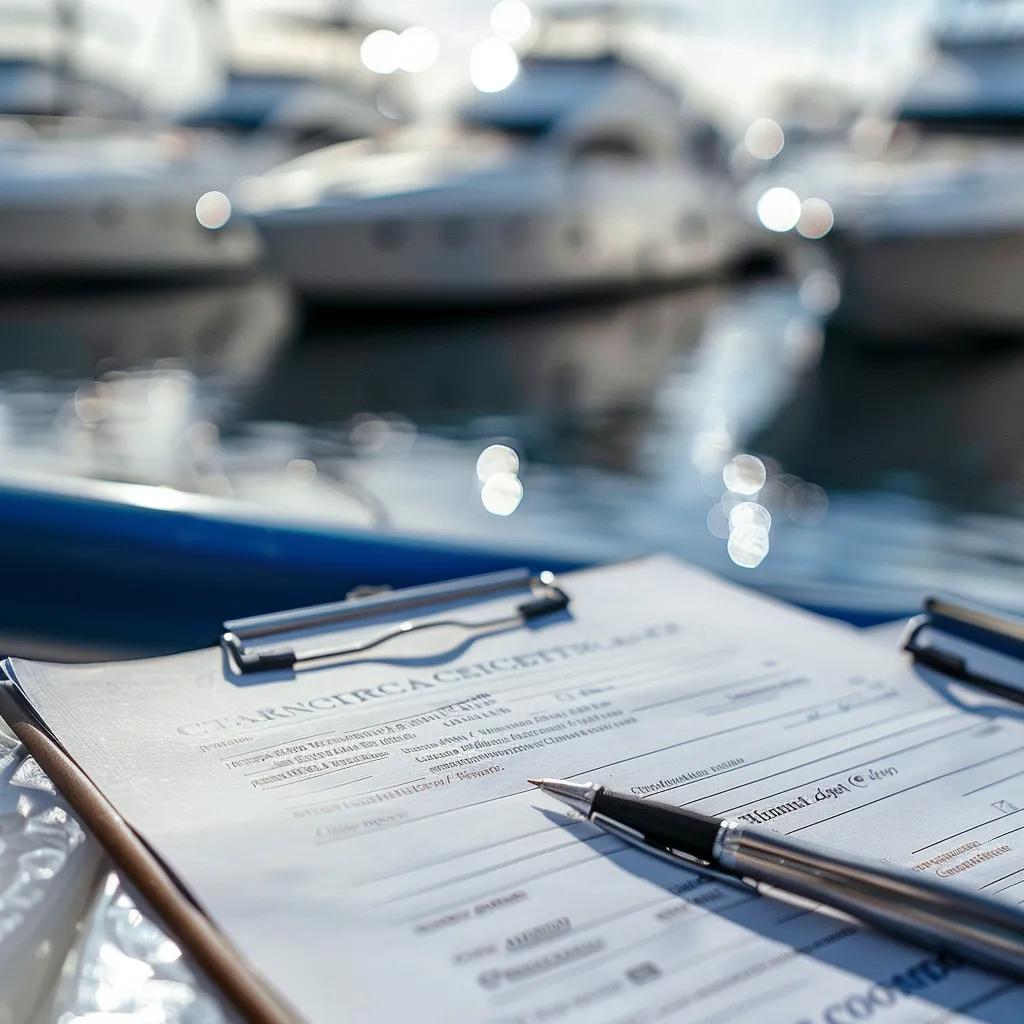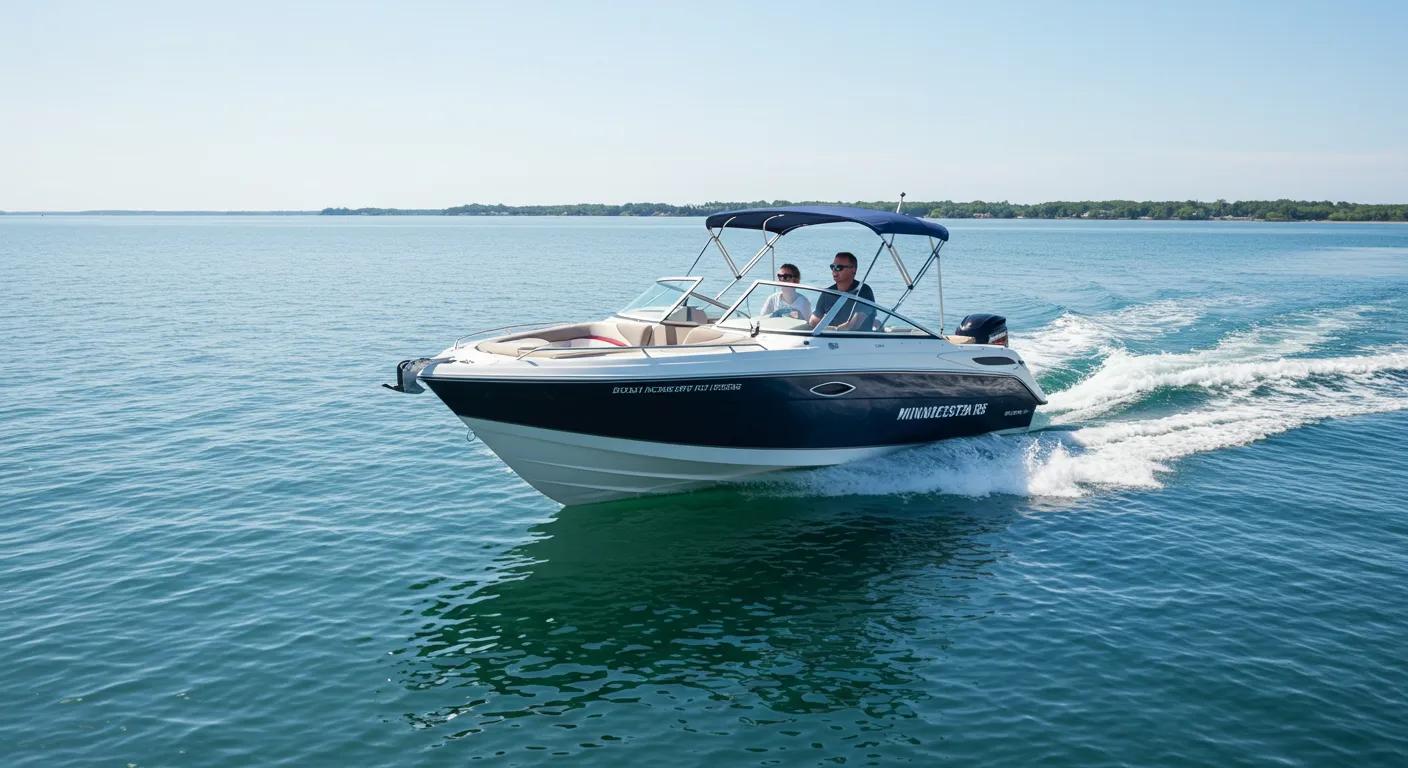Ensure your safety on winter roads! Understand the risks of worn tires and how they relate to insurance claims. Drive smart and stay protected this season.
Understanding Boat Insurance Requirements in Minnesota

Do You Need Insurance to Register a Boat? Complete Guide to State Requirements and Registration

Registering a boat raises an essential question: do you need insurance to register a boat? With over 12 million recreational vessels on U.S. waterways and thousands of accidents reported annually, understanding when insurance is legally required—or simply prudent—can save owners from fines, liability claims, and financial loss. This guide maps state-by-state mandates, conditional requirements from lenders and marinas, coverage types tied to registration, necessary documents, exemptions and special cases, and why insurance remains a smart choice even when not mandated.
Which States Require Boat Insurance for Registration?

Only a handful of U.S. states mandate boat insurance as part of the vessel registration process. These laws typically target motorboats over specific horsepower thresholds or personal watercraft (PWC) in certain jurisdictions. The following table summarizes current mandates:
| State | Entity | Attribute | Value |
|---|---|---|---|
| Arkansas | Motorboat | Horsepower threshold | Over 50 HP |
| Utah | Motorboat | Liability insurance minimum | $25,000 per incident |
| Hawaii | Any boat in facilities | Facility insurance requirement | Liability coverage for boats in DOBOR marinas |
| Washington | Historic/Large boat | Vessels over 35 ft & 40 years old | Marine liability policy |
| New York | Personal watercraft | PWC registration insurance mandate | Liability coverage for PWCs on public waters |
State-by-State Boat Insurance Mandates
Several U.S. states have specific requirements for boat insurance, often tied to the horsepower of the motor or the type of watercraft. These mandates are in place to protect against potential liabilities and ensure financial responsibility in case of accidents or damage.
This source provides a comprehensive overview of state-specific boating laws, which directly supports the article’s discussion of insurance mandates.
These five jurisdictions represent current legal mandates for boat insurance during registration, setting thresholds by horsepower, size, vessel age, and facility operation. Understanding each state’s nuance prepares owners for compliance and risk management.
What Are the Boat Insurance Laws in Arkansas and Utah?
Arkansas requires motorboat owners to carry liability insurance when registering vessels equipped with engines exceeding 50 horsepower. This mandate protects against bodily injury and property damage, with minimum coverage limits set by state statute. In Utah, owners of motorboats with more than 50 HP must demonstrate at least $25,000 liability insurance per occurrence. Both states enforce proof of insurance at the Department of Natural Resources or DMV counter before issuing vessel registration certificates.
How Does Hawaii Regulate Boat Insurance for Registration?
Hawaii’s Department of Boating and Ocean Recreation (DOBOR) mandates liability insurance for any vessel moored or stored in state-run facilities. While privately docked boats on non-state property are not always subject to this rule, entering a DOBOR harbor triggers the requirement for coverage that protects marinas, other boaters, and the public from collision and environmental damage liabilities.
What Are Washington State’s Insurance Rules for Older and Larger Boats?
Washington State places unique requirements on vessels older than 40 years and longer than 35 feet under the Department of Licensing’s marine program. Owners must hold a marine liability insurance policy that covers third-party injury and damage. These provisions aim to safeguard both historic vessels and modern megayachts, ensuring older hulls and complex systems have financial protection in case of accidents.
Are There Insurance Requirements for Personal Watercraft in New York?
New York law specifically mandates liability insurance for personal watercraft (PWC) registration on public waters. Coverage must include at least $25,000 for bodily injury and $10,000 for property damage per incident. The state enforces proof of insurance at local DMV offices before issuing PWC registration decals.
Which States Do Not Require Boat Insurance for Registration?
Most U.S. states do not legally require insurance to register a boat. Owners in California, Florida, Texas, Michigan and over 40 other jurisdictions can register motorboats and PWCs without presenting an insurance policy. However, absent state mandates, financing and marina rules often fill the gap, making coverage effectively compulsory for many owners.
Is Boat Insurance Mandatory for Registration or Only in Specific Cases?
Boat insurance is mandatory by law only in clearly defined circumstances. Beyond state statutes, conditional requirements can stem from lenders, docking facilities, and specific vessel categories.
When state law applies, the requirement kicks in under conditions such as engine horsepower, vessel length, or location in state-run facilities. Outside of these, lenders almost universally require insurance to protect loan collateral, and marinas demand proof of coverage before issuing slip agreements. Personal watercraft often have separate registration mandates, as seen in New York and some European jurisdictions.
When Is Boat Insurance Required by State Law?
Boat insurance becomes legally required when a state regulation explicitly links registration to minimum coverage. Common triggers include:
- High-horsepower motorboats exceeding 50 HP.
- Vessels longer than 35 feet and older than 40 years in specified states.
- Personal watercraft registration on public waterways.
- Boats moored or stored in government-run marinas.
How Do Lender and Financing Requirements Affect Boat Insurance?
Financing a boat necessitates insurance because lenders treat a vessel like any other collateralized asset. Loan agreements typically stipulate:
- Liability coverage matching or exceeding state minimums.
- Hull and comprehensive protection to cover damage or total loss.
- Named loss payee endorsement favoring the lender.
This layer of requirement applies regardless of state registration mandates, ensuring the boat’s value remains insured throughout the loan term.
Do Marinas and Docking Facilities Require Proof of Boat Insurance?
Many private marinas and docking facilities insist on liability insurance as a condition for slip rental or mooring. Facility managers typically require:
- A minimum of $100,000 liability per occurrence.
- Additional insured endorsement naming the marina.
- Seasonal proof of coverage before permit issuance.
These rules protect marina owners and fellow boaters from damages or pollution incidents.
What Are the Insurance Requirements for Personal Watercraft (PWC)?
Personal watercraft often carry separate insurance mandates due to their speed and agility. Common requirements include:
- Liability coverage for bodily injury and property damage.
- Medical payments coverage for rider injuries.
- Optional towing and assistance for breakdowns on the water.
Meeting these requirements ensures safe PWC operation and registration compliance where mandated.
What Types of Boat Insurance Coverage Are Needed for Registration?
Registration-linked coverage typically focuses on liability protection, but owners should understand additional options that enhance safety and asset protection.
Liability insurance pays for third-party bodily injury and property damage when you’re at fault. Comprehensive and collision coverage safeguard the vessel itself against sinking, theft, or collisions. Specialty policies address wreckage removal, fuel spill liability, and uninsured boater incidents.
| Coverage Type | Attribute | Value |
|---|---|---|
| Liability Insurance | Bodily injury per incident | $25,000–$300,000 |
| Comprehensive & Collision | Vessel damage coverage | Up to agreed value |
| Wreckage Removal | Environmental protection | $5,000–$25,000 |
| Fuel Spill Liability | Pollution cleanup | $10,000–$50,000 |
What Is Liability Insurance for Boats and Why Is It Important?
Liability insurance for boats covers legal expenses, settlements, and medical costs when you injure someone or damage another party’s property. This foundational coverage prevents out-of-pocket losses that could reach tens of thousands of dollars, offering peace of mind on crowded waterways.
Liability Coverage in Boat Insurance
Liability insurance is a crucial component of boat insurance, covering costs associated with bodily injury or property damage to third parties. This coverage is essential for protecting boat owners from significant financial burdens that can arise from accidents on the water.
This citation supports the article’s explanation of liability insurance and its importance in protecting boat owners from financial risks.
How Do Comprehensive and Collision Coverage Protect Your Boat?
Comprehensive coverage reimburses repair or replacement costs from non-collision events such as theft, vandalism, or sinking. Collision coverage handles damages from accidents with docks, other vessels, or stationary objects. Together, they support vessel value preservation beyond state-required liability.
What Specialty Boat Insurance Policies Should Owners Consider?
Specialty policies address gaps in standard plans:
- Wreckage removal covers salvage costs after a sinking.
- Fuel spill liability pays cleanup expenses and regulatory fines.
- Uninsured boater coverage reimburses damages when the at-fault party lacks insurance.
How Does the Boat Registration Process Work and What Documents Are Needed?
Registering a boat involves proving ownership, providing vessel details, and paying fees. The process typically follows these steps:
- Complete a title or bill of sale verifying ownership.
- Obtain or provide the Hull Identification Number (HIN).
- Fill out the state’s registration form, available at DMV or DNR offices.
- Present proof of insurance if required by statute or lender.
- Pay registration fees, which vary by vessel length and horsepower.
Each state agency issues decals and registration certificates valid for one to three years, after which renewal is necessary.
What Proof of Ownership Is Required for Boat Registration?
States require one of the following documents to verify ownership:
- Manufacturer’s Certificate of Origin (new boats).
- Signed and notarized bill of sale.
- Certified title transfer from previous owner.
These documents prevent title disputes and confirm legal possession before registration.
Where and How Do You Register Your Boat?
Most states handle boat registration through:
- Department of Motor Vehicles (DMV).
- Department of Natural Resources (DNR).
- Equivalent Marine Licensing Divisions.
Owners submit forms in person or online, attach required documents, and pay fees before receiving registration credentials.
What Fees and Forms Are Involved in Boat Registration?
Registration costs typically range from $30 to $300, based on vessel type, length, and horsepower. Common forms include:
- Vessel registration application.
- Odometer or engine service record (for certain states).
- Proof of insurance affidavit (if applicable).
Fees cover administrative costs, conservation programs, and search-and-rescue funding.
Are There Exemptions and Special Cases for Boat Insurance and Registration?
Certain vessels and scenarios fall outside standard insurance or registration mandates. Exemptions often apply to non-motorized crafts, small boats, and U.S. Coast Guard–documented vessels.
Which Boats Are Exempt from Insurance or Registration Requirements?
Exempt vessels typically include:
- Non-motorized paddlecraft used exclusively on private lakes.
- Sailboats under a certain length (often under 18 feet).
- Historic or antique vessels maintained as private artifacts.
These exemptions reduce administrative burdens for low-risk boat owners.
How Are Documented Vessels Regulated Differently by the U.S. Coast Guard?
Documented vessels hold a Certificate of Documentation issued by the U.S. Coast Guard, replacing state registration. Owners file annual tonnage taxes and follow federal safety regulations, but liability insurance is generally not mandatory—though lenders and operators often still require it.
What Are the Insurance and Registration Rules for Antique or Historic Boats?
Antique vessels may qualify for special registration classes with reduced fees, yet insurance providers often require classic boat endorsements. These policies account for restoration value, hull age, and specialized repair costs, ensuring historical integrity while providing modern liability protection.
Why Is Boat Insurance a Smart Choice Even If Not Required for Registration?

Insurance improves boating experiences by mitigating financial risks, supporting swift accident recovery, and enhancing marina acceptance. Coverage applies to theft, sinking, collision, and liability claims, offering three key benefits:
- Protection against high repair and medical costs following an incident.
- Peace of mind that legal expenses and lawsuits are covered.
- Access to towing, wreckage removal, and emergency assistance services.
How Does Insurance Protect Against Accidents, Theft, and Liability?
Boat insurance provides:
- Accident coverage for collision repair costs.
- Theft protection reimbursing stolen vessel value.
- Liability defense covering lawsuits and medical payments.
These coverages support owners in scenarios that otherwise cause severe financial strain.
What Are the Financial Risks of Not Having Boat Insurance?
Without adequate coverage, an owner faces:
- Lawsuit judgments exceeding $100,000.
- Replacement costs for a stolen or totaled vessel.
- Environmental cleanup fines after fuel or oil spills.
These risks underscore the critical role of insurance in preserving personal and third-party assets.
How Can Boat Insurance Improve Your Boating Experience?
Beyond risk transfer, insurance can:
- Provide 24/7 towing and on-water assistance.
- Offer guidance on safety inspections and maintenance.
- Unlock discounted rates at partner marinas.
These value-added services streamline ownership and promote responsible boating practices.
What Are Common Questions About Boat Insurance and Registration?
Boat owners often seek clarity on registration-linked insurance, lender mandates, marina requirements, and coverage types. Addressing these queries enhances preparedness and ensures smooth compliance across all scenarios.
Which States Require Boat Insurance for Registration?
Only Arkansas, Utah, Hawaii (state-run facilities), Washington (historic/large vessels), and New York (PWC) currently mandate boat insurance for registration. Other jurisdictions leave coverage decisions to owners, lenders, and marinas.
Is Boat Insurance Mandatory If I Finance My Boat?
Yes. Financing agreements almost always require full insurance with the lender named as loss payee, regardless of state registration laws. This ensures the boat’s value remains protected throughout the loan term.
Do Marinas Require Proof of Boat Insurance?
Many private marinas and docking facilities demand liability coverage—often $100,000 per occurrence—as a condition for slip rental and mooring permits. This requirement applies even in states without official insurance mandates.
What Types of Insurance Coverage Are Needed for Different Boats?
When it comes to insuring your boat, the type of coverage you need largely depends on the kind of vessel you own and how you plan to use it. For example, if you own a speedboat, you may require different coverage than if you have a sailboat or a fishing boat. Generally, boat insurance can include several types of coverage: liability, collision, comprehensive, medical payments, and uninsured/underinsured boater coverage. Liability insurance is crucial for all boat types, as it protects you against lawsuits arising from injuries or property damage to others while you’re operating your vessel. This coverage is particularly important for larger and faster boats, as they can cause more significant harm in accidents.
Sailboats and long-term cruising vessels might also require additional coverage, such as navigational limits and coverage for personal belongings onboard. If you use your boat for commercial purposes or participate in boating activities like racing, you should consider specialized insurance policies that cater to these specific needs. Furthermore, some insurance providers offer tailored packages based on factors like the boat’s size, age, and storage location, which can also impact your coverage requirements. Ultimately, it’s essential to assess your unique situation and speak with an insurance professional who can help you navigate the complexities of boat insurance, ensuring that you have the necessary protection to enjoy your time on the water confidently.
Liability insurance remains the core requirement for registration-linked cases. Owners should also consider comprehensive and collision coverage for vessel protection, along with specialty policies like wreckage removal and fuel spill liability to address environmental risk
When it comes to insuring your boat, understanding the nuances of collision and comprehensive coverage is crucial. Collision coverage is designed to protect you against the costs associated with physical damage to your boat resulting from an accident, whether it involves another vessel, a stationary object, or even a dock. This type of insurance can be particularly important for those who own high-value boats, as repairs can be costly and out of pocket expenses can quickly add up. On the other hand, comprehensive coverage offers protection against a broader range of potential issues beyond collisions. This includes damages from storms, theft, vandalism, or other unforeseen incidents that could result in significant financial losses. By investing in both coverages, you not only safeguard your investment but also ensure peace of mind while enjoying your recreational time on the water.
Moreover, it’s important to note that if you finance your boat through a bank or financial institution, they often require both collision and comprehensive coverage as conditions of the loan. This requirement is in place to guarantee that their collateral remains protected throughout the duration of the loan. Therefore, having these coverages can be seen as not just a smart choice for personal protection, but also a necessity when it comes to meeting lending obligations. Ultimately, whether you’re a seasoned sailor or a first-time boat owner, taking the time to evaluate your coverage needs will pay off in the long run, giving you the security to navigate the waters without worry.
How Do I Get Proof of Insurance for Boat Registration?
To register a boat with an insurance requirement, request an insurance binder or declaration page from your provider showing coverage limits, policy number, effective dates, and the issuing agency. Submit this document to the DMV, DNR, or state boating office at the time of registration.
Owners who navigate state mandates, lender stipulations, and marina rules with clarity find fewer surprises and greater confidence on the water. By aligning insurance choices with registration requirements and personal risk profiles, every boater secures both legal compliance and financial peace of mind.
Author:
Nathan Betters Insurance Agency MN. Licensed Property & Casualty Agency



